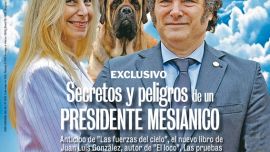Former president Mauricio Macri (2015-2019) broke his four-month public silence on Wednesday, lamenting in an interview "the global leadership vacuum" that, according to him, has led to governments taking hasty decisions to face the coronavirus pandemic.
"Due to a lack of global leadership, the world launched into measures that it later had to begin to correct on the fly, and this lack of global coordination affected a lot," Macri said in an online interview with journalist Álvaro Vargas Llosa, the first one he has granted since his presidency ended last December.
The Cambiemos leader urged citizens and leaders "not to be carried away by fear and panic, but by data." This lack of leadership "does not mean that we will emerge with less globalisation," he said, predicting "greater coordination" would emerge as a result of the pandemic.
The former president said that there had been a "revolution of expectations" among citizens. "Today a person receives in 30 days all the information that 30 years ago they received in a lifetime This is the first pandemic that coexists with the technological revolution – with WhatsApp, Twitter, Instagram. We have never been so informed and at the same time so confused," he said, warning that social networks gave voice to extreme opinions and reactions.
Macri was quizzed on a number of global issues, as well as the strengthening of democracies in Latin America and the challenges facing leaders in office today. The president avoided casting scorn on leaders such as Brazil President Jair Bolsonaro, US President Donald Trump and Chinese premier Xing Jingping, describing Beijing as a key ally for Latin American nations and highlighting the six bilateral meetings he held with the Asian leader. Words of praise were also offered to Colombian President Iván Duque.
Highlighting its upcoming election, Macri said the United States "is going to be focused on its internal politics," but he rejected the idea that the world is going to witness "a decline of the United States as a global leader."
He added that populism for him was "weakening," predicting "strengthened liberal democracies" in the post-pandemic future, saying citizens were more "empowered" than ever before.
Macri on Argentina
The former president said he maintains "a commitment" to his Argentina's politics and declared he will seek to strengthen his Juntos por el Cambio coalition ahead of next year's midterm elections.
"Despite the lack of economic results, the support of the people was still great. My commitment is absolute. I love my country. I am committed to liberty. We will strengthen Juntos por el Cambio and the space will grow," he said.
The opposition has voiced concerns about the heavy restrictions imposed to tackle the coronavirus pandemic by the government and Macri also criticised the Alberto Fernández administration.
"Unfortunately, we have seen a government that has tried to diminish freedoms – freedom of expression, the functioning of justice, the independence of powers and private property. But what it has generated is a monolithic, active, strong reaction from society that has mobilised to express itself against these abuses, and the same on the part of the opposition, which has demonstrated more unity," he said.
Macri expressed concern that the crisis could be viewed as an opportunity for some leaders.
"In some countries we have had governments that believe that the pandemic is a good opportunity to advance in these soft authoritarianisms, which, if not taken seriously, can lead to a dictatorship like Venezuela," Macri cautioned.
President Fernández has argued that the lockdown he imposed on March 20 in Argentina was a move to "save lives" amid the Covid-19 pandemic, despite the heavy economic impact which will arrive as a result. The country was gripped by a two-year recession even before the coronavirus arrived on local shores, dating back to the Macri administration's time in office. The government is now seeking to restructure more than US$66 billion in foreign debt, with Argentina unable to tackle its heavy debt burden, which totals around 90 percent of GDP.
To date, Argentina has recorded more than 87,000 confirmed cases of Covid-19, of which around 36,500 people have recovered. Close to 1,700 people have died. More than 90 percent of all infections have been registered in the Buenos Aires Metropolitan Area (AMBA), where almost a third of the population lives.
The quarantine restrictions imposed by the government have been loosened in many parts of Argentina, though a strict lockdown remains in place in the AMBA region.
– TIMES/AFP






















Comments